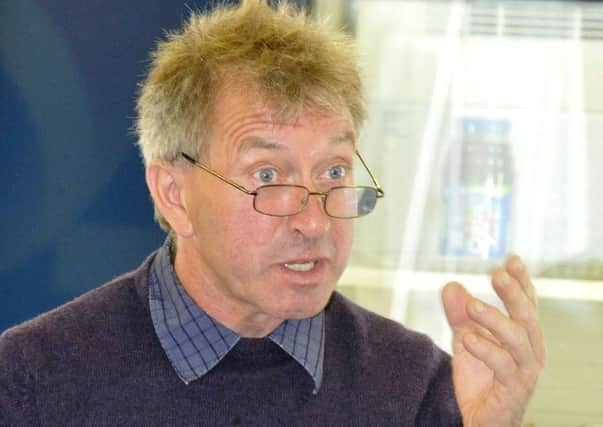EU DEBATE: '˜A vital role in our economic prosperity'


Between 2007 and 2013, the county received around £48million through the EU Structural Funds to support business growth and job creation, improve digital links, regenerate communities and boost the county’s tourism sector.
Projects included the Berwick Workspace, which received funds to support business tenants and others in the local area; the £16million iNorthumberland project, which is providing superfast broadband to thousands of homes and businesses; and an additional £1million to support digital business growth.


Advertisement
Hide AdAdvertisement
Hide AdCoun Allan Hepple, cabinet member for economic growth, said: “European funding plays a vital role in the economic prosperity of Northumberland.
“Without the benefit of EU investment, many of the ambitious projects the county council has helped to deliver would simply never have happened and the investment can be seen clearly in the success of our local businesses, the widespread adoption of new technology and the massive growth of Northumberland tourism.
“Arguably, this business relationship is more important now than ever before, as our national resources continue to shrink.”
Northumberland also benefited from EU funds through the Common Agricultural Policy, with farmers across the county receiving an estimated £60million from the Basic Payment Scheme in 2015.


Advertisement
Hide AdAdvertisement
Hide AdCoun Dougie Watkin, a farmer in Norham, says the loss of EU subsidies would be a disaster for the farming industry, which employs around 5,000 people in Northumberland.
He said: “Most farmers will invest every penny of the European money they receive – which more than equates to their profits – on agricultural supplies within a few miles of where they live. So the loss of that money to our rural communities would be unimaginable.
“On a personal level, the other big thing for farmers is the uncertainty that EU withdrawal would cause regarding the capital value of the land.
“Also, we have three very large and successful oxen markets and a livestock industry which is right on the margins of profitability.
Advertisement
Hide AdAdvertisement
Hide Ad“From the point of view of the county, I can’t see what could be done to make up for the loss of European funding.”
iNorthumberland Business Support has helped businesses capitalise on the availability of superfast broadband, through a combination of free online training and practical workshops.
Alnwick-based artist Pam Vardy was able to raise her business profile and attract new customers after learning all about social media, digital marketing and search-engine optimisation through the programme.
Pam said: “I have found all of the online training courses really useful and the balance between the online training and in-person masterclasses have been just right for me – helping put into practice and bring to life some of the topics I have learned.
Advertisement
Hide AdAdvertisement
Hide Ad“I would highly recommend the training to other Northumberland-based businesses and look forward to attending more masterclasses myself.”
‘Money will still be spent on our priorities’
Following the Northumberland County Council report on the funding it receives from the EU, Berwick MP Anne-Marie Trevelyan, who is campaigning for Britain to leave, has shared her views:
One of the most common themes that crops up among those arguing for us to remain in the European Union is that of funding.
The argument is incoherent, as so many arguments for remaining hitched to the failing political project are, but that hasn’t stopped it being used to scare people.
Advertisement
Hide AdAdvertisement
Hide AdThe argument is simple and goes like this; the EU directs funding to many things we need and like, therefore if we leave the EU those things we need and like will be without funding and will suffer and fail.
It is an argument that has been used to attempt to scare farmers into voting to remain, even though if we left we would be able to give farmers more money and develop a system which doesn’t penalise them as the present, bureaucratic EU system does.
The argument ignores the fact that if we leave, we would be able to direct UK taxpayers’ money, presently funnelled into the EU, and then on to other countries as well as back to us, to the things we want to spend money on; our priorities, many of which will remain the same.
Instead of sending £350million per week to the EU, and then reacting with gratitude when it sends some of it back (with strict conditions attached), we can spend that money on farmers, universities, science, technology and public services via decisions made by UK politicians who can be held to account.
Advertisement
Hide AdAdvertisement
Hide AdIn the case of farmers, the Conservative Government has already pledged that if we vote to leave the EU, UK farmers will receive at least the same level of funding they presently receive. The Government will be free to invest in some incredibly worthwhile projects according to rules which favour the UK.
It was interesting to hear from Northumberland County Council that they think they would not be able to make a good case to receive funding from a future British Government outwith the EU. This is the same British Government that just last month gave the council an extra £14.6million for flood repair costs and £1.2 million for pothole repairs.
Funding for vital services, whether it be farming or regional development funds, will continue regardless – it is better for Britain if that funding comes from our Government and is spent in a way that is accountable to the British people.
By voting to leave, we would take back control and set up systems that work for our public services and our people.